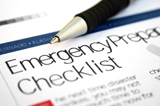
Disaster-Proof Your
Business
by Jeff
Wuorio
used with permission from the Microsoft Business Site
 If you're a business owner, you need to know how to protect
your business.
If you're a business owner, you need to know how to protect
your business.
Try as we might, there's often no way to skirt disaster — whether it's national, personal or weather induced. But there are strategies to cope with it as best we can, no matter if its source is a burst river levee, a thoughtlessly discarded match, or the deranged actions of others. Knowing what to do in the event of a disaster is crucial for anyone, of course, but particularly for a small-business owner, whose livelihood may depend on a small storefront or home basement office.
Start with some strategies. Here's a checklist that can help you set up an effective and comprehensive small-business disaster plan:
1. First, map out a disaster plan. Many business owners haven't given a thought as to what they might do in the event of a fire, earthquake or some other sort of catastrophe that could damage their business severely. So, work up a detailed plan, taking into account as many variables as you can imagine. Take planning for earthquakes and other natural disasters seriously. You should know where you can move your merchandise to safety and where you can reach your insurance agent in a hurry. Draw up a map of shut-off valves for gas, electricity and other utilities. Draft the same sort of plan for other emergency situations, such as floods, fires and even civil unrest. For example, one note to yourself might be that in the event of riots, or even just a rash of robberies, you would leave your lights on at night so the police could spot anyone trying to break in. "It's an old barber shop trick, but think about leaving the cash register open and in plain view," says Gayle Marco, an associate professor of marketing at Robert Morris College in Pennsylvania. "That way, everyone can see there's no money in there."
2. Back up computer files somewhere else. Any business owner with extensive computer files and records needs to back them up on a regular basis. But take that bit of common sense a step further and make certain your backups are located somewhere other than your business. For instance, look into mainframe computer services that offer backup space — those might be located across town or across the continent, but just make certain that, should something happen to your business, your backup files are safely ensconced somewhere else. Even better: Ask anyone with whom you work, such as an accountant or attorney, how they back up their files that pertain to your business. Another option is "cloud" storage, in which your essential data is backed up on a network of remote servers, through services such as Windows Azure.
3. Don't forget to store physical papers and records off-site, too. Don't overlook the safety of tangible records, such as printed client lists, bills and receipts. Unless your stacks are the size of hay bales, a safety deposit box at the bank should be perfectly adequate. In fact, safe storage of business records of all sorts protects you from another type of tragedy, namely, disaster that occurs somewhere else but which affects you. "Those records are your business's identity," says Marco.
4. Keep insurance current. Growth is wonderful, but prosperity without commensurate insurance can be disaster knocking at your front door. Meet with your insurance agent on a regular basis to make certain that your coverage is up to date. That's particularly true with a home-based business. Since many homeowners' policies might not cover business equipment and supplies, check with your insurance company so you're certain that your business gear is protected. If need be, obtain extra policies or insurance riders. Finally, try to spend the extra money to get guaranteed replacement coverage. That way, you won't have to reach into your own pocket to make up for any coverage shortfalls.
5. Set up an emergency cash reserve. Personal financial experts routinely suggest that families set aside three to six months of living expenses for use in emergency situations. If possible, take the same road with your business. That way, should something nasty happen, you'll have money available to pay rent, meet your bills and keep payroll flowing without having to resort to layoffs.
6. Let others know your disaster strategy. Don't treat your disaster planning as a state secret. Make sure your employees understand what they need to do should the worst occur. Take that even further, and let your clients and customers know what you'll likely do in the event of some sort of disaster. Telling customers that you've got contingency plans in case of emergency will increase their confidence in you; they'll know you plan to keep your business up and running, no matter the circumstances. "You need to let all sorts of people know what you're going to do so they don't panic," says Marco. "The more they know that you're ready, the less likely they'll panic if something does happen."